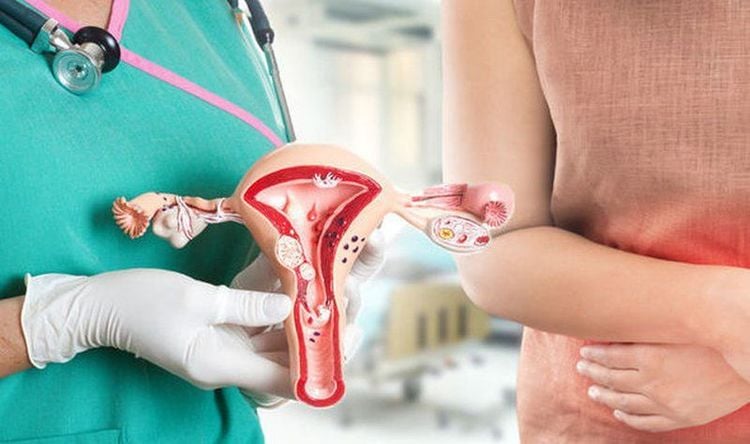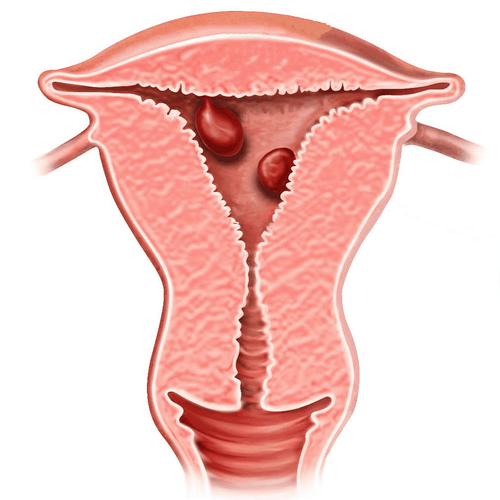This is an automatically translated article.
The article was professionally consulted with Specialist Doctor II Huynh Thi Hien - Department of Obstetrics and Gynecology - Vinmec Nha Trang International General Hospital.Uterine polyps are quite common in women of all ages. The vast majority of cases of uterine polyps are benign, but the disease can affect the ability to become pregnant and give birth, in addition, there can be some cases of malignant progression causing uterine cancer. .
1. What are uterine polyps?
Endometrial polyps, also known as endometrial polyps, are caused by the overgrowth of endometrial glands and stroma. The endometrium is the lining of the uterus, separating the uterine cavity from the uterine muscle, the uterine lining grows thick and thin with the menstrual cycle.The size of polyps can be from a few millimeters to several centimeters, the number can be one or more, the structure is pedunculated or pedunculated. And they can develop anywhere in the uterine cavity.
2. Causes and factors causing uterine polyps
The disease is associated with increased levels and effects of endogenous or exogenous estrogens. The disease is rarely seen in adolescence, usually increasing with age.Obesity: Women with BMI ≥ 30 have an increased risk of uterine polyps up to 55% Using Tamoxifen as a drug to treat breast cancer, increasing the risk of uterine polyps Other risks such as: Treatment with hormone replacement therapy in premenopausal women containing estrogen, Lynch() and cowden() syndromes...

3. How to detect uterine polyps
The disease can be confused with uterine fibroids (tumors that develop from the muscle of the uterus) to accurately diagnose uterine polyps using the following methods:Transabdominal pelvic ultrasound and transabdominal ultrasound transvaginal probe is the first choice) Uterine pump ultrasound helps diagnose polyp shape, location is better than vaginal probe Hysteroscopy in addition to helping diagnose polyp shape, location Hysteroscopy can simultaneously intervene to remove polyps. To determine whether the polyp is benign or malignant, a biopsy of the polyp is required
4. Are uterine polyps dangerous?
Endometrial polyps, if not detected and treated early, can cause some of the following complications:Endometrial polyps are one of the causes of infertility and infertility in women. When large size, or polyps affect sperm motility and egg implantation.
People with uterine polyps have a high risk of polycystic ovaries.
Causes chronic anemia due to uterine bleeding.
Increases the amount of vaginal secretions, so it changes the vaginal environment, creating favorable conditions for harmful microorganisms to grow, causing vaginitis, vulvovaginitis and cervicitis...
When In pregnant women, uterine polyps also grow, causing pressure on the fetus, causing miscarriage, premature birth, etc. As for the mother, there is an increased risk of placenta previa.
Increases the risk of uterine cancer and cervical cancer. Uterine polyps can be infected, necrotic, Inflammatory phenomenon spreads to the endometrium, uterine muscle for a long time, leading to uterine cancer.

5. How to treat uterine polyps?
5.1 Conservative treatment and follow-up In the case of uterine polyps smaller than 10mm and no clinical symptoms, about 6.3% of polyps can regress on their own.Regularly monitor the growth of polyps.
5.2 Medical treatment IUDs containing levonorgestrel, can prevent the formation of uterine polyps, especially in breast cancer cases with tamoxifen
5.3 Surgical treatment Indicated in most cases In case of uterine polyps such as:
Having symptoms of the disease. Cases without symptoms include: Size > 1.5cm, multiple polyps, polyps protruding out of the cervix, polyps in infertile cases. Surgical treatment of uterine polyps includes:
Hysteroscopy to remove polyps. In-field hysterectomy found cancerous cells in the polyp. Endometrial polyps after treatment can improve symptoms up to 75-100%, recurrence rate is low and improve pregnancy status from 43-80%. The disease is usually benign, but if not detected, monitored and treated promptly, it can cause many dangerous complications, especially uterine cancer.
Please dial HOTLINE for more information or register for an appointment HERE. Download MyVinmec app to make appointments faster and to manage your bookings easily.














